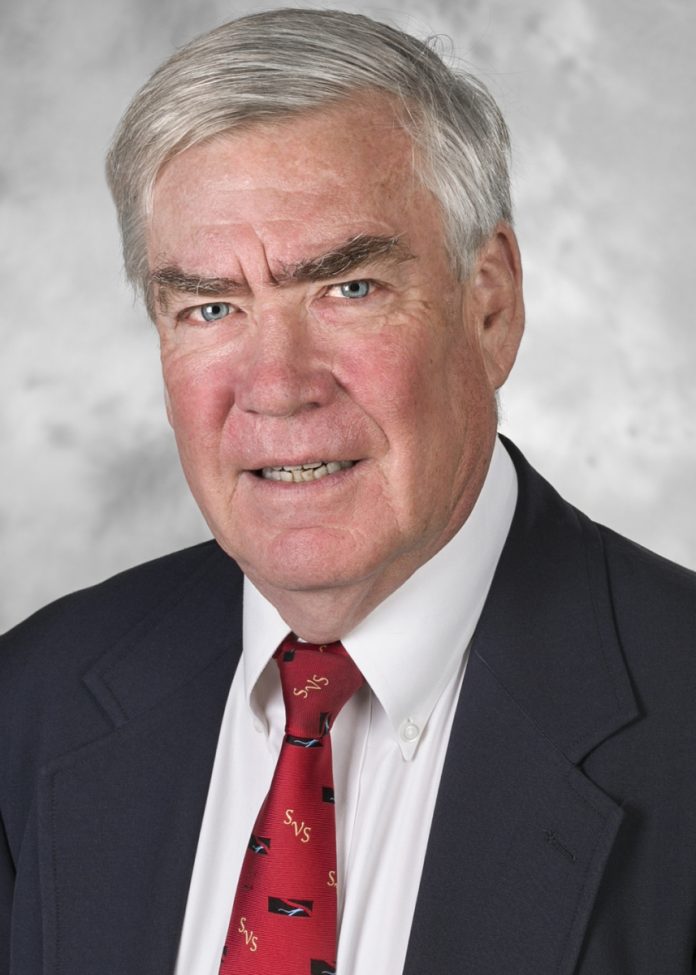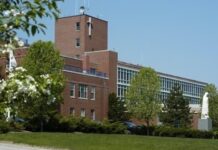Dr. Robert Patterson, a vascular surgeon affiliated with The Miriam Hospital and a clinical professor of surgery at the Warren Alpert Medical School of Brown University, received the Charles “Bud” Kahn, M.D., Lifetime Leadership Award in June. The award, named after Dr. Charles “Bud” Kahn, a retired endocrinologist at Miriam Hospital, was presented at the annual meeting of The Miriam’s Medical Staff Association on June 14.
Patterson was nominated for the honor by several people in the hospital’s medical community. The award recognizes “outstanding leadership over a lifetime of service” and a physician who “exemplifies professionalism and leadership in a variety of ways, to include open communication, collaboration, cooperation, commitment and integrity.” Patterson, of Warwick, has been a practicing surgeon for nearly 30 years.
PBN: What has most surprised you during the last three decades of vascular medicine and surgery?
PATTERSON: The paradox of increasingly sicker and older patients despite substantial improvements in outcomes from surgery and medical care. We may be suffering from our own success – as patients receive better care, we are faced with a much more challenging population.
PBN: Dr. Kristopher Davignon, associate chief of anesthesia for The Miriam and Rhode Island Hospital, notes that vascular disease is a multi-organ specialty. Can you elaborate on that?
PATTERSON: The blood vessels – arteries and veins – connect every organ in the body. Except for the brain and heart, vascular surgeons provide medical management, minimally invasive therapies and, when appropriate, complex open-surgical reconstruction for all varieties of disease affecting these vessels. We perform surgery on the arteries in the neck to prevent stroke, open or stent-graft procedures for aneurysms of the aorta, and bypass or stenting to save a limb from amputation. Every day is a new challenge.
PBN: Well-known types of vascular disease include stroke, abdominal aortic aneurysm and blood clots. What do you consider the most pervasive health threat among them?
PATTERSON: These are all critically important. Disease of the arteries in the neck, carotid arteries, is responsible for approximately 20 percent of strokes. Prevention of recurrent events is the role of carotid surgery, or in some cases stenting. How to manage disease that is not causing symptoms is the focus of a national trial, CREST2, that I am participating in, to try to define the role of surgery versus best medical care for patients with disease that does not cause symptoms.
For both carotid disease and aortic aneurysm disease, simple noninvasive ultrasound tests are available for patients who are at risk to discover problems before they cause trouble, and to assist in planning management.
PBN: What is the most effective thing a person can do in their self-care to avoid or limit their risk of vascular disease?
PATTERSON: Not smoking, having a daily modest exercise program – as simple as walking and using the stairs, eating sensibly, and addressing issues of high cholesterol and blood pressure. Many vascular diseases can be managed with good medical care, observation and noninvasive therapies such as exercise programs. Keeping people out of my operating room is as much a part of my practice as performing interventions.
PBN: Dr. Tristen Chun noted you’ve earned a great deal of respect as an attending surgeon. Can you describe your approach to cooperating with fellow surgeons?
PATTERSON: Surgeons are generally high-performing, quality-focused professionals. Vascular surgeons have the privilege of frequently interacting and supporting surgeons from many different specialties, and we all bring unique skill sets to the table and learn from each other. Some surgeries are truly a “team sport” and patients benefit from cooperation between surgeons with different skill sets.
Rob Borkowski is a PBN staff writer. Email him at Borkowski@PBN.com.













